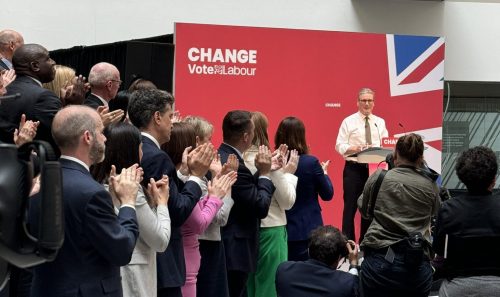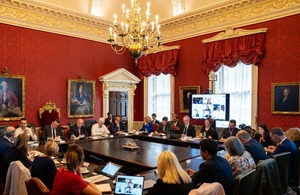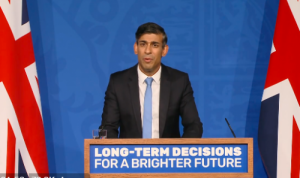Labour will run ‘dynamic and strategic state’ with an industrial strategy

Labour’s General Election manifesto launch at the Co-operative Building in central Manchester today (13 June 2024) placed economic growth and an industrial strategy at the centre of its “change” message for a new government.
With just 21 days to go until polling day, Keir Starmer championed a far more interventionist approach than the Conservatives under Rishi Sunak who appear to have ditched ‘industrial strategy’ as a policy, the manifesto also claimed Labour’s approach will depend on “a dynamic and strategic state.”
Adding: “This does not mean ever-growing government, but it does mean a more active, smarter government that works in partnership with business, trade unions, local leaders, and devolved governments.”

Angela Rayner
After an opening by deputy leader Angela Rayner, next up at the launch was Richard Walker, chief executive of Iceland, who until recently was a Conservative supporter who had even applied to be a Tory MP.
However, he said in the introduction to the manifesto Walker now supports Labour: “As a business leader, I am sick and tired of chaos under the Conservatives. I am absolutely convinced that Keir Starmer is the leader to deliver the change this country needs. “
Labour’s new industrial strategy will be advised by an Industrial Strategy Council, made up of representation from all nations and regions, business and trade unions.”
The strategy will “back what makes Britain great” and “will ensure a pro-business environment.”
Specific industries named as priority sectors included financial services, automotive, life sciences, and creative sectors.
A £7.3 billion National Wealth Fund will support projects like clean energy investment and will allocate: £1.8 billion to upgrade ports and build supply chains across the UK; £1.5 billion to new gigafactories; £2.5 billion for the steel industry; £1 billion for carbon capture; and £500 million to support the manufacturing of green hydrogen.
Michael Moore, BVCA chief executive held back his obvious disappointment that Labour is persisting with its plan to close the loophole on carried interest for partners in private equity funds.
“Private equity is the only industry where performance-related pay is treated as capital gains. Labour will close this loophole,” the manifesto said.
Moore said: “At a time when all political parties recognise that growth is the key priority, we will work to maintain the internationally competitive arrangements which attract capital and investment professionals to the UK.”
“Labour have set out their taxation position. And we have shown the party how much venture capital and private equity contributes to the UK, backing 2.2 million jobs across the economy, in addition to the 140,000 in the industry itself.
“This ecosystem provides the UK with a significant competitive advantage in securing investment and jobs. So, whoever wins the election, we will look forward to discussing how venture capital and private equity will continue to be partners for growth in the UK.”
The building and housing finance sector welcomed Labour’s pledge to back an overhaul of planning laws and start a massive housebuilding programme, including restoring mandatory housing targets and force councils to have up-to-date Local Plans.
Simon Peacock, head of regions at JLL, the world’s leading property advisory business, said: “It’s heartening to see Labour grab the bull by the horns and be so bold in its commitments to level up the UK’s economy.
“While finances might be tight and other issues generating more headlines, the need to drive real growth in the regions remains as important as ever. Take the power grid, for example, where the infrastructure currently in place has deterred investment and stymied growth for too long.
“Businesses will also be hoping it can do more to ease the load on the planning system. While there’s no quick fixes, one way they could make a success of the current system is through a concerted investment programme in the right amount, and quality, of planners to support local governments in their decision making. Those we speak to say they’re prepared to pay a higher premium to ensure the resources are there to make planning quicker and easier.
“It’s also good to see Labour remain committed to devolution and giving locally elected mayors the powers to enact real change. After 14 years in the cold the party might have been tempted to keep its new-found power centralised, but devolving it has been crucial to giving businesses the confidence to invest in their towns and cities, powering growth and creating jobs. “
Ryan Etchells, Chief Commercial Officer at leading housing lender Together, said: “A crackdown on ‘nimbyism’, commitment to build 1.5m new homes and plans to re-use brownfield land is all well and good. But it will be interesting to see whether the Government of whichever colour will be able to deliver on the support SME house builders need to make these ambitions a reality. This will be key for planning reform and encouraging access to finance for development.”
Other commitments include “brownfield first approach” to planning, the release of lower quality ‘grey belt’ land and a requirement of all Combined and Mayoral Authorities to strategically plan for housing growth in their areas. Taken together they called this “the biggest increase in social and affordable housebuilding in a generation.”
On that Paul Dolan, the new Chief Executive of Riverside, headquartered in Liverpool, and one of England’s largest landlords managing more than 75,000 homes and operating in around 175 local authority areas in England, said: “We are also encouraged that under Labour’s Grey Belt proposals developers will have to build more social and affordable homes, but we need to see this driven through specific targets set under the golden rule.”
On skills and education the manifesto promised new Technical Excellence Colleges “which will work with businesses, trade unions, and local government to provide young people with better job opportunities and the highly trained workforce that local economies need.”
It also included a promise to “reform the Conservatives’ broken Apprenticeships Levy.”






